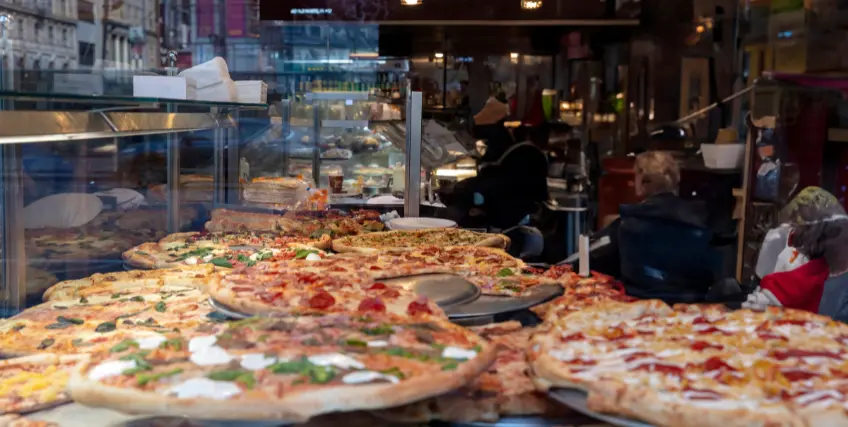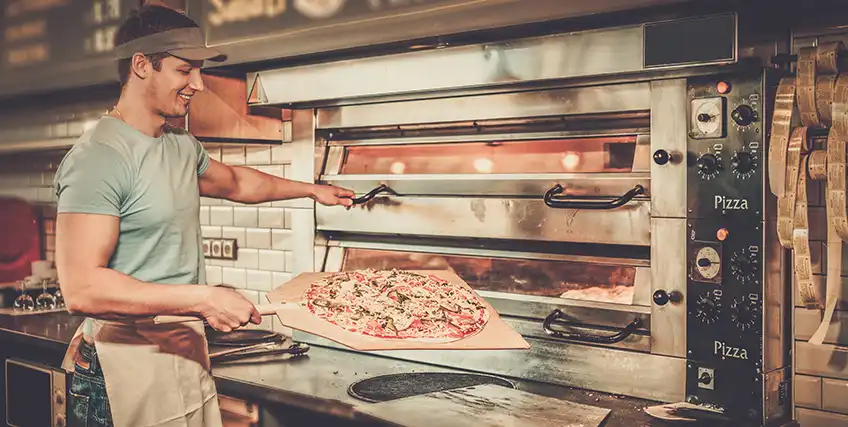How to Improve Your Pizza Shop Credit Score for Better Loan Offers
February 20, 2025 | Last Updated on: February 24, 2025

A strong pizza shop credit score is crucial for securing better loan offers, lower interest rates, and flexible repayment terms. Financial platforms typically evaluate your payment history, credit utilization, and outstanding debts for your pizza business. This helps in maintaining a solid financial profile which in turn can significantly impact your ability to secure loan offers. However, a lower credit score can lead to limited funding options, higher costs, and stricter repayment conditions. Fortunately, there are ways to improve credit scores with the right strategies. These include paying bills on time, reducing outstanding balances, and managing credit wisely.
Here we will talk about the effective ways to boost your pizza shop credit score. These strategies will help you unlock better financing opportunities, expand operations, and build long-term financial stability for your business.
Why Does Your Pizza Shop Credit Score Matter?
Getting the right financing option for your pizza shop can be quite challenging, especially when your business score isn’t where it should be. Various financial institutions rely on your credit scores for business loans to assess risk. As a result, a lower credit score can lead to higher interest rates, stricter loan terms, or even loan denial. On the contrary, a higher credit score can open doors for better loan terms, higher credit limits, and more favorable repayment terms.
Funding plays an important role in the growth of a business and maintaining a healthy pizza shop credit score should be a priority. If you need capital to upgrade your kitchen, expand to a second location, or just manage your operational costs, your credit score loan will significantly impact your financing options. However, some strategies can help you improve your credit score and position your pizza business for better funding opportunities.
Although improving your pizza shop credit score takes time, consistently making on-time payments and keeping your credit utilization low can make a big difference. Financial platforms evaluate payment history, credit utilization, and outstanding debt, addressing these areas can strengthen your creditworthiness. You can regularly review your credit report to identify and dispute errors while reducing debt. This will show the financial players that you are better at managing your credit responsibly. Additionally, working with vendors that report to business credit bureaus can help build a positive payment history, strengthening your pizza business credit profile over time.
Quick Ways to Improve Your Pizza Shop Credit Score
It is important to maintain a strong pizza shop credit score for securing financing, obtaining better loan terms, and expanding your pizza business. Since financial platforms assess multiple factors when evaluating credit score loans, making targeted improvements can enhance your ability to assess capital. Here are some of the quick ways to improve your pizza shop credit score to expand operations or refinance existing debt.
Open a Business Account
Maintaining separate personal and business finances is a crucial step toward improving your credit score for your pizza business. However, opening a dedicated business bank account for your pizza shop and using it for all financial transactions will help improve the credit score for business loans. Also, keeping your financial records well organized and demonstrating consistent cash flow can improve your standing with financial players.
Pay Your Bills on Time
One of the most crucial factors influencing your pizza restaurant business score is your payment history. Late payments can negatively impact your credit score which makes it harder to qualify your loans with good terms. To avoid missing due dates, consider setting up automatic payments or using reminders to stay on track. Whether it’s rent, utility bills, or vendor invoices, paying bills on time helps build credibility with financial platforms and business credit bureaus.
Reduce Credit Utilization
Credit utilization refers to the percentage of your available credit that you’re using. For instance, if your credit limit is $50,000 and you’ve used $40,000, your credit utilization is 80%. This percentage can significantly hurt your credit score. Therefore, you should aim to keep your credit utilization rate below 30%, as recommended by Experian. This will help you to demonstrate responsible credit management for your pizza shop credit score.
Check and Correct Credit Report Errors
Errors such as incorrect payment records or accounts that don’t belong to you can unfairly lower your business score. The best way to rectify the errors is to regularly review your business credit report and dispute inaccuracies with credit bureaus. This will help to ensure true financial standing for your pizzeria.
Build Separate Business Credit
There are numerous small business owners who rely on personal credit for business expenses. However, establishing a separate business credit can strengthen your financial profile for your pizza shop credit score. It’s always better to apply for a business credit card and trade credit with vendors to ensure your business transactions are reported to credit bureaus. This will help you build a strong credit history for your pizza shop.
Increase Your Credit Limits
Requesting a higher credit limit can also improve your credit utilization ratio, benefiting your overall score. Nevertheless, be sure to use the additional credit responsibly as maxing out new limits can negate the benefits of an increased credit line.
How a Good Credit Score Leads to Better Loan Offers?
A high pizza shop credit score makes it significantly easier to secure better loan offers, lower interest rates, and higher borrowing limits. Since financial platforms use your business score as a primary indicator of financial reliability, a strong credit history reassures them that your business is capable of managing debt responsibly. As a result, you are more likely to get approved for a loan faster and secure competitive terms. These can be beneficial when looking for funds to purchase new ovens, renovate your shop, or expand to a second location.
Moreover, businesses with good credit scores can access a wide array of financing options like SBA loans, Business Lines of Credit, and Equipment Financing. A higher score not only improves your eligibility but also enhances your negotiation power. This allows you to secure more flexible repayment terms and better funding conditions. Additionally, a strong credit score demonstrates financial discipline, which can help in building long-term trust with the financial platforms, making future borrowing easier and more cost-effective.
Hence, it is better to proactively manage your credit score so that you can position your pizza shop for sustainable growth and take advantage of future funding opportunities. You can explore expansion plans, invest in modern kitchen equipment, or hire additional staff with improved financial health. This will also make your journey of loan applications smooth and efficient.
Common Pitfalls That Can Hurt Your Pizza Shop Credit Score
Maintaining strong credit requires consistency, however, certain mistakes can negatively impact your ability to secure financing. Small business owners unknowingly make errors that lower their credit scores. This makes it difficult for them to access better loan terms and credit options. Identifying these common pitfalls can help you take proactive steps to protect your financial health and keep your pizza shop’s credit score in good standing.
Missing Payments
Missing payments or making late payments can significantly lower your credit score, making it harder to obtain financing. Make sure to align all your payment schedules in time as even one late payment can stay on your credit report for years.
Overusing Business Credit Cards
Carrying high balances or maxing out business credit cards can raise your credit utilization ratio, which can negatively impact your business score. Making timely payments and keeping balances low can help maintain a healthier credit profile. Therefore, making multiple small payments throughout the billing cycle can show effective credit handling.
Applying for Too Many Loans at Once
Each loan application triggers a hard inquiry, which can lower your credit score temporarily. Lenders can view your business as financially unstable if you apply for too many applications in a short period. Make sure to space out your credit applications and only apply for necessary financing options, as this can keep your score intact.
Not Monitoring Your Credit Report
Failing to review your credit report can result in unnoticed mistakes or fraudulent activity, damaging your credit score without your knowledge. It is crucial to carefully review your credit report regularly to detect issues early and take corrective action in time.
Final Thoughts
Summing this up, your pizza shop credit score plays a critical role in securing the best loan options and growing your business. Making timely payments, opening a business account, reducing debt, and actively monitoring your credit report, can improve your financial standing. This in return will unlock better loan offers, higher credit limits, better repayment terms, and lower interest rates. To secure the best financing solutions tailored to your needs apply today and take the next step toward securing the financial future of your pizza shop.
Frequently Asked Questions on Pizza Shop Credit Score
What is a business credit score and why is it important for my pizza shop?
A business credit score measures your pizza shop’s reliability and creditworthiness, just like your personal credit score, but for your business. It is important for your pizza shop as a lender to assess the risk when approving small business loans. This business credit score helps in determining the loan terms, interest rates, and borrowing limits.
What are the key factors that influence my business credit score?
The key factors that influence your business credit score include payment history, credit utilization, outstanding debt, length of credit history, and public records (bankruptcies).
Will applying for multiple loans at once hurt my pizza shop credit score?
Yes, applying for multiple loans at once can hurt your pizza shop credit score. Each loan application triggers an in-depth inquiry, which temporarily lowers your credit score. Too many inquiries in a short period can signal financial stability to lenders, making future loan approvals a bit challenging. Make sure to apply for only one application at a single time and apply only, when necessary, to protect your credit score.
How often should I check my business credit score?
You should check your business credit score at least quarterly. However, monthly monitoring is ideal if you’re seeking loans or improving your credit score. Regular checkups help you to identify the errors, track progress, and address issues before they impact credit business loans or financing opportunities. Also, there are many credit bureaus that offer monitoring services to keep you updated on any changes.
Are there loan options available for pizza shops with no credit history?
Yes, pizza shops with no credit history can still qualify for loan options. However, these options might be limited. Lenders may offer secured loans, merchant cash advances, or SBA microloans without established credit. Hence, working with vendors who report payments to business credit bureaus can help build credit over time. This will improve the eligibility for better business loan options in the future.




